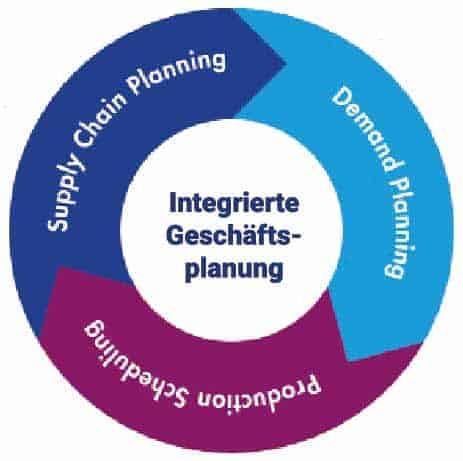Midmarket 4.0
![[shutterstock:566330062, Indypendenz]](https://e3mag.com/wp-content/uploads/2017/02/shutterstock_566330062.jpg)

Business planning and management is an ongoing issue for companies - especially in view of increasingly dynamic and globalized markets.
More and more companies are therefore specifically focusing on holistic supply chain planning in order to achieve benefits for the entire company by harmonizing individual business areas.
SAP has moved into the spotlight. First and foremost, the Walldorf-based IT group has raised awareness of the importance of a barrier-free flow of information with its SAP IBP solution and sees enormous potential for optimization in the supply chain through the dissolution of department-specific insular knowledge.
Away with the islands
 The (competitive) advantage is clear: holistic supply chain management enables companies to respond more quickly to changes in the market as well as on the customer and order side - simply because of the seamless flow of information from warehouse management through production planning and distribution to the management level.
The (competitive) advantage is clear: holistic supply chain management enables companies to respond more quickly to changes in the market as well as on the customer and order side - simply because of the seamless flow of information from warehouse management through production planning and distribution to the management level.
"SAP IBP is an ingenious tool."explains Björn Dunkel, Managing Director of GIB, a certified SAP Software and Silver Partner.
The planning tool for supply chain management integrates the requirements from marketing, sales, scheduling and production planning in one platform and thus enables holistic control.
Dunkel observes a massive pull on existing customers:
"We have been a partner of SAP since 2000, and while we have been very successful in selling our supply chain optimization solutions on a module-by-module basis, i.e. serving stand-alone solutions, we are now seeing more inquiries about integrated solutions."
It is more and more about optimizing across departments and modules.
The Siegen-based software company GIB specializes in the further development of SAP-based supply chain processes and, with its core product, the SAP-certified GIB Dispo-Cockpit, offers an add-on solution that has already enabled many national and international companies to significantly improve their process management and controlling.
The modules of the GIB-Dispo-Cockpit family can already be used in combination and thus offer the possibility to view and plan supply chain processes holistically.
Early Bird Specialty Provider
GIB started in 2005 with the Operations MRP Cockpit module; today, this is supported by five additional modules, all closely interlinked. This creates maximum transparency across all SCM processes and areas.
With the GIB Dispo-Cockpit, therefore, not only the individual islands such as production, distribution, logistics, sales planning are improved, but all supply chain management processes can be optimized holistically and across the board.
Challenges only arise when optimization is required across multiple SAP systems.
"We have many customers who are already using all of the Dispo Cockpit modules and now, after SAP's push on Integrated Business Planning, they come to us and want holistic optimization implemented"
"Therefore, we too will be looking at SAP IBP as a possible addition to our portfolio."
Thomas Reeken, Director Operations and Development at GIB, summarizes:
"Our customers understand that the linked view enables them to realize complete optimization in driving out the entire business."
The focus of the GIB Dispo Cockpit is on operational planning and not on the strategic area. This has the advantage that users can respond (even) faster to short-term or unplanned events such as special orders or disruptions.
Achieve ROI quickly
In the GIB Dispo-Cockpit, medium-sized companies find a cost-optimized and yet effective instrument with which they can quickly and without risk control their SCM processes directly from one system without overusing internal resources.
This ensures short project runtimes and an early ROI.
"We don't compete in scope and functionality with SAP's IBP tool."
Dunkel says,
"because we are the optimizer in terms of all-encompassing operational supply chain planning in medium-sized businesses."
Conclusion:
With SCM solutions that are precisely tailored to their needs, such as the Dispo-Cockpit from Siegen-based GIB, small and medium-sized enterprises can holistically optimize their supply chain management by eliminating islands of information along the supply chain and thus creating a continuous and transparent flow of information.
This enables them to react more quickly, be more agile on the market - and be that decisive step ahead of their competitors.





